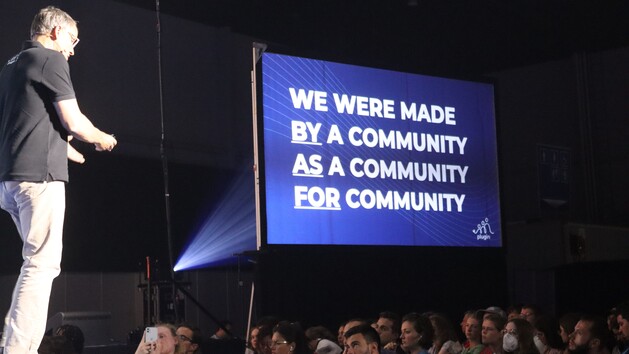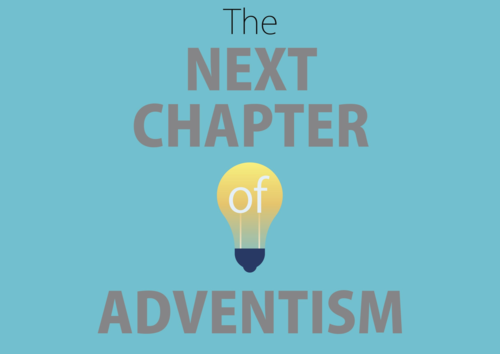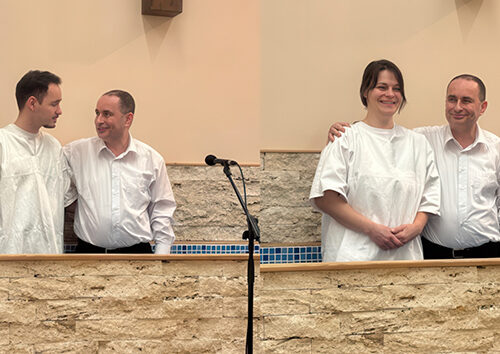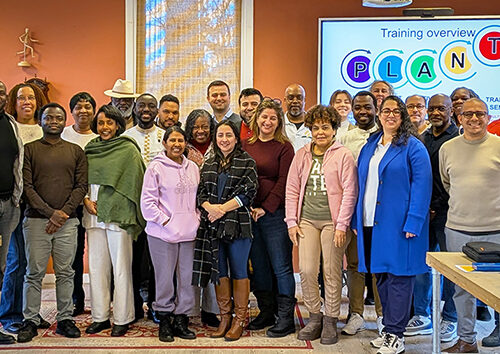25 July 2024| St Albans, UK [David Neal]
How will Adventism look in the middle decades of the twenty-first century? Thirteen theologians reflected on this at the Newbold Bible Conference, organised by Newbold College of Higher Education in the spring of 2022. With their collective thoughts now published in book form, The Next Chapter of Adventism – Confronting Challenges, Seizing Opportunities, edited by Newbold lecturers Laszlo Gallusz and Julian Thompson, they call for responsible engagement with Scripture and a deeper commitment to the Gospel’s call to love and care for all people in the name of Christ.
In this review, the aim is to highlight the ‘challenges’ and the ‘opportunities’, followed by a general observation.
Stephen Currow: Seven Challenges Facing Adventism
Currow outlines seven challenges based on Paul’s letter to Timothy, including emerging heresies, the loss of focus on Christ, and living as Christians amidst discrimination. He suggests that preaching the Word and living a life of faith are antidotes to these challenges. He calls for the church to actively engage with civil society and be present in the marketplace.
Gifford Rhamie: What Does Justice Look Like?
Rhamie discusses the decline of Adventism’s tradition of social justice and the persistence of various forms of discrimination. He argues that justice is what love looks like in public, and calls on the church to embody principles from Micah, Amos, Isaiah, and Psalms, and to speak truth to power when necessary.

Dragoslava Santrac: Women in Biblical Times and the Adventist Church
Santrac examines the historical and theological contexts influencing the status of women in the Adventist Church, noting the disparity in gender equality. She urges the church to empower women to fully utilize their God-given gifts in ministry, emphasizing that Christ’s redemptive work reaffirms the equality of both men and women.
Laszlo Gallusz: How Long, O Lord?
Gallusz addresses the challenge of maintaining hope in the Second Coming of Christ. He argues that simply repeating “Jesus is coming soon” is insufficient and calls for a balanced approach. “Dare we believe Jesus is coming soon?” Gallusz asks. “The answer is yes! Most definitely, yes! He is coming soon! But soon needs to be interpreted primarily salvation-historically… We should opt for a balance between the apocalyptic and healing aspects of the Gospel.”

Ivan Milanov: Adventists and Conspiracy Theories
Milanov discusses the mistrust and suspicion towards institutions exhibited by some Adventists during the pandemic. He advocates for seeking information from multiple sources and interpreting the Bible as a whole to avoid falling into conspiracy theories. “This approach,” Milanov argues, “will help in examining uncomfortable facts through a biblical lens and adhering to the authority of the Holy Spirit.”
Jan Barna: Google, Adventism, and Algorithmic Truth
Barna critiques the Adventist organisational structure’s reliance on committee votes to discern truth. How do we solve the problem of truth practically, ecclesiologically, on the organisational level in terms of its governance? Is a majority vote in committee or session a clear-cut signal that God’s will be done? The answer lies in recognising that we need “Somebody else beyond our collective decision-making process, to authorise our right to speak the truth. Without our individual bond to God, we have no claim to a proxy for the truth.”

Patrick Johnson: Ableism and Disability
Johnson highlights how the Adventist concept of health reform can in its extreme form lead to ableism, neglecting the needs of those with disabilities. To counteract ableism, Johnson emphasises the importance of creating inclusive communities by getting to know individuals beyond their disabilities and prioritising communal health. Two tips – the church “needs to be conscious of the language it uses; and secondly, we need to be intentional about using the Bible to inspire positive attitudes.”
Pilira Zapita: Holy Spirit Deficit Disorder
Does the church suffer from ‘Holy Spirit deficit disorder’? asks Zapita. Highlighting the neglect of the Holy Spirit in Adventism, where the work and manifestations of the Spirit are often met with suspicion and caution, “Yes, we do”, says Zapita. Instead, we must re-balance our spirituality and connect mind and heart. “Let us engage in radical unlearning, learning and relearning about life in the Spirit of God. Only God knows the full extent of what awaits us…”

Jonathan Holder: Waiting for Jesus to Return
Holder addresses the inadequacy of simply telling people “Jesus is coming back” without addressing their current suffering. “It’s time for us to take another look at Matthew 24:14 which says something even more interesting that the ‘when’ of his coming,” says Holder. “What if we asked the question, ‘Why is Jesus coming back?’… It’s there in verse 14. He’s coming back, not to remove us from the world, but to take us into what the world truly should be… The kingdom isn’t just something you proclaim; the kingdom is something you live.”
Julian Thompson: The Word Became Digital
Thompson has discovered that “the medium – or rather, media – through which we access Scripture has changed dramatically – and for some, replacing the book (the Bible in print) by accessing the Bible on the same devices that we use for work… somehow makes the Word less tangible and real.” Trends are showing that digital formats and Bible apps could be helping in more consistent Scripture engagement. “In reality,” concludes Thompson, “it comes down to our perception.”

Marianne Thieme: Perfectionism in Society and Adventism
Thieme critiques the perfectionism and meritocracy in society and Adventism, which place undue pressure on individuals. Thieme is convinced that it’s time to rediscover “true Christianity [which] frees us from self-centredness and hence from perfectionism. We cannot earn salvation; it is the gift of Christ to all imperfect believers who genuinely repent and faithfully want to be with Him. As Jesus said: ‘Come to me, all you who are weary and burdened, and I will give you rest.’ (Matthew 11:28).”
Tihomir Lazić: Churchless Spirituality
“Churchless Christians,” says Lazić, “are an example of those who, wearied by a sense of dependency and conformity within the church, crave for freedom and self-discovery… Despite their efforts to bring change and improvement within the church, they often experience little success. Over time, such individuals start to resent the claustrophobic, irrelevant, and controlling nature of their community.” The only way to solve this dysfunction, reasons Lazić, is when all “come to reside ‘in Christ’, [as] the individual ‘I’ evolves into a shared ‘We’, marking a significant transition from an isolated existence to one that’s profoundly relational. We are created by a community, as a community, and for a community.”

Eike Mueller: Making Sense of the Bible Today
“No time in history has seen such a proliferation of new approaches to read and interpret the Bible as the present,” says Mueller. Underlying all views is hermeneutics, which is a complex process of connecting ancient times, peoples and cultures with our world today. Mueller cites John Stott who calls it “‘bridge-building in which the interpreter enables ‘God’s revealed truth to flow out of the Scriptures into the lives of the men and women today.'”

Some Observations
The big picture plea I hear from the book is to engage responsibly with Scripture. If we don’t, we will end up going down all sorts of strange alleys and bump into conspiracy theories. Engaging responsibly with Scripture creates not only theological balance, but also theological conviction. When Adventism loses its conviction about the return of Christ, it’s time to close the doors of the church. But as Laszlo Gallusz says, “We should opt for a balance between the apocalyptic and healing aspects of the Gospel.”
What I hear from the theologians to the church is: “Dear Lord and Father of mankind, forgive our foolish ways; reclothe us in our rightful mind…”
More please!
I hope that the Newbold Bible Conference continues to be anchored in the calendar as an annual event – a platform for theologians to speak with balance, depth, experience, and conviction to the church on relevant issues. With Newbold’s renewed focus on the training of students for pastoral ministry, it could be useful for a future Newbold Bible Conference to be a platform for helping the church understand the theological foundation and practice of pastoral ministry in the 21st century.
Confronting a growing challenge
I share this in the context of a serious challenge the church faces in relation to pastoral care. This is what I have frequently and painfully heard, far too often from members in recent times. “The church family know I’m struggling with a life threatening illness, but I still haven’t been contacted or received a visit from my pastor.” Another shares, “I’ve not been attending church for the last two years. My pastor has never contacted me. I must not be not missed.” Another shares, “I wish my pastor and our church leaders would work intentionally to resolve the conflicts circulating in our church, rather than let them fester as so often seems the case.”
The Next Chapter of Adventism—With the breadth of challenges covered, it will not be difficult for any thoughtful member to connect with most of the theologians’ concerns. This is a good reflective read for anyone who wishes for Adventism to embrace opportunities to help it grow both deep and wide in the years to come.
- Pastors attending the TED European Pastor’s Council in Belgrade from 27 – 31 August will receive a copy of The Next Chapter of Adventism in their welcome pack.
- Lectures from the 2022 Bible Conference can be viewed at: the https://www.newbold.ac.uk/2022-bible-conference/
- The Next Chapter of Adventism can be purchased from LifeSource Christian Bookshop for £8.95 + postage and packing
Photos: Featured image (Stanborough Press), Shutterstock, David Neal.



